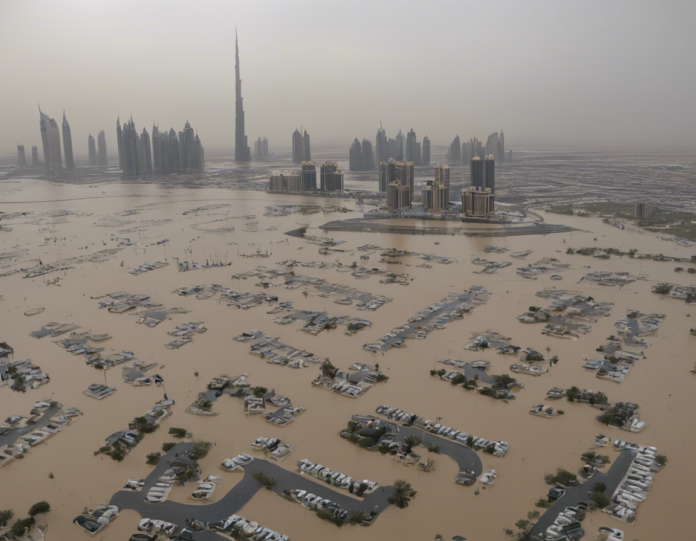Dubai, known for its opulent skyscrapers, luxury shopping, and vibrant nightlife, recently experienced unprecedented flooding that left residents and tourists stunned. The city, located in the United Arab Emirates (UAE), is more commonly associated with arid desert landscapes and scorching temperatures rather than heavy rain and waterlogged streets. The unexpected deluge that swept through Dubai not only disrupted daily life but also raised concerns about the city’s infrastructure and its preparedness for extreme weather events.
Causes of the Flooding
The flooding in Dubai was primarily caused by a rare phenomenon known as a cloudburst. A cloudburst is an intense rainfall event characterized by a high amount of precipitation in a short period of time. In this case, the city experienced a sudden and severe downpour that overwhelmed its drainage systems and led to widespread flooding. Additionally, urbanization and impermeable surfaces such as concrete and asphalt in densely populated areas can exacerbate flooding by preventing water from being absorbed into the ground.
Impact on Residents and Infrastructure
The flooding in Dubai had far-reaching consequences for residents, businesses, and infrastructure. Roads were submerged under water, causing traffic congestion and delays in transportation. Some buildings and homes were also inundated, leading to property damage and displacement of residents. The city’s stormwater drainage systems were put to the test and, in some areas, proved inadequate to handle the volume of water, resulting in localized flooding.
Government Response and Future Preparedness
In the aftermath of the flooding, the Dubai government swiftly mobilized emergency response teams to assist those affected and mitigate the damage. Officials reassured the public that measures would be taken to improve the city’s resilience to extreme weather events. This includes enhancing flood control infrastructure, implementing better urban planning strategies, and raising awareness about climate change adaptation.
Climate Change and Extreme Weather Events
The flooding in Dubai serves as a stark reminder of the increasing threats posed by climate change and the rising incidence of extreme weather events worldwide. As global temperatures continue to rise, the frequency and intensity of heavy rainfall, storms, and floods are expected to increase. It is crucial for cities like Dubai to proactively adapt to these changes by investing in sustainable infrastructure and embracing resilient urban planning practices.
Tips for Coping with Flooding in Dubai
- Stay informed about weather forecasts and warnings issued by local authorities.
- Avoid driving through flooded areas to prevent accidents and damage to vehicles.
- Prepare an emergency kit with essential supplies such as food, water, medications, and flashlights.
- Keep important documents and valuables in a waterproof container or safe place.
- Follow evacuation orders if instructed by authorities to ensure your safety.
Frequently Asked Questions (FAQs)
Q: Is flooding a common occurrence in Dubai?
A: While Dubai is known for its arid climate, occasional flash floods can occur, especially during the rainy season from November to March.
Q: What should I do if my property is flooded in Dubai?
A: Contact emergency services for assistance and avoid entering flooded areas until it is safe to do so. Document the damage for insurance purposes.
Q: Are there flood warning systems in place in Dubai?
A: Dubai has a well-established meteorological department that issues weather alerts and warnings to inform the public about potential floods and other weather hazards.
Q: How can I protect my home from flooding in Dubai?
A: Consider installing flood barriers, elevating electrical systems, and ensuring proper drainage around your property to reduce the risk of flooding.
Q: Is climate change a factor in the increasing incidence of flooding in Dubai?
A: Yes, climate change is contributing to more frequent and intense rainfall events globally, including in regions like Dubai. It is important for cities to adapt and mitigate the impacts of climate change.
In conclusion, the recent flooding in Dubai serves as a wake-up call for city planners, residents, and policymakers to prioritize sustainable and resilient infrastructure development in the face of climate change. By taking proactive measures to enhance drainage systems, improve urban design, and raise awareness about flood risks, Dubai can better withstand future extreme weather events and protect the well-being of its inhabitants.

